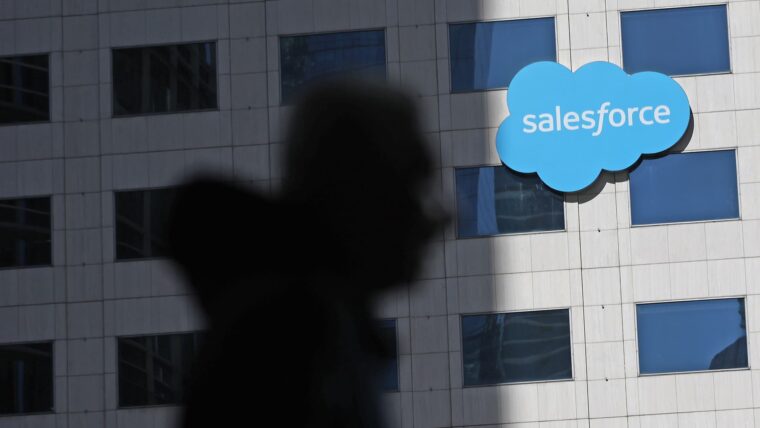For the better part of the last decade, we’ve heard that software is eating the world. But now it seems AI is eating software. That’s the call analysts at Melius Research are once again making Monday as they downgraded one-time market darling Adobe to a sell rating. The attention-grabbing note highlights the far-reaching ripple effects that artificial intelligence is having across the stock market — and investors must be attune. Club name Salesforce is in the crosshairs of the shifting landscape, and we cannot ignore that fact. It’s a major reason why the stock and that of enterprise software peers Atlassian and Workday have struggled in 2025. In Melius’ view, the rise of AI is to software what the rise of cloud computing was to on-premise data centers. Historically, companies would maintain their own data centers in-house, requiring massive investments in hardware and teams of engineers there to maintain and troubleshoot any issues. Today, however, companies can outsource this simply by hopping on the cloud computing bandwagon, utilizing the likes of Amazon Web Services, Microsoft’s Azure and Alphabet’s Google Cloud. AWS became the first modern cloud service to launch in 2006. The rise of the cloud was bad news for the stocks of on-premise hardware providers such as Dell , Hewlett-Packard and IBM . As this shift to cloud computing took hold, Melius noted that these companies all saw a steep contraction in their price-to-earnings multiples, a classic sign that investors believe slower growth is ahead. “Just when you thought the coast was clear, their PE multiples kept going lower and lower — from the 20s to mid-single digits,” Melius wrote Monday. Club name Microsoft was also a key provider of software for on-premise servers. However, Microsoft did adjust its strategy with the launch of cloud service Azure. The cloud was a priority for CEO Satya Nadella upon taking over in early 2014, and it’s paid off handsomely for investors — just take a look at the stock chart versus the S & P 500. MSFT .SPX mountain 2013-12-31 Microsoft’s stock performance versus the S & P 500 since the start of 2014. Microsoft would have no doubt been on that list of on-premise fallen angels — even if not a hardware play like Hewlett-Packard and Dell — had they not jumped on cloud computing and instead kept their fate tied to the on-premise hardware providers. Azure is the No. 2 cloud by revenue behind AWS and is seeing growth reaccelerate thanks to AI. The lesson from Microsoft: If you’re business model is being disrupted, you can still adapt, survive and thrive. However, if you’re getting disrupted and fail to adapt, then the valuation that investors are willing to pay for your stock will reflect that failure. Instead, the investors will move on to owning the disruptors in question, which, in the present moment, are the AI players pushing into the software-as-a-service space. Often abbreviated as SaaS, this business model was all the rage not too long ago itself. Instead of companies paying for a perpetual license to use a specific version of software, SaaS companies sold their product on a subscription basis, bringing in a more predictable recurring revenue stream that investors were willing to assign a higher multiple. It often involves a “seat model,” where companies pay based on the number of employees using the software. Melius believes it’s under real threat. “We think companies are increasingly understanding that AI tools can help cut expensive knowledge workers with those costly SaaS seats. In fact, opex is going down as a percent of sales across tech leaders since the AI boom started. One of the ways they are doing it is reducing workers who typically are the biggest consumers of SaaS … and Adobe could be impacted as other companies catch on,” the Melius analysts wrote in their downgrade. They added, “We think there will be FOMO across all industries to cut costs and get their stocks up – SaaS is the casualty as AI adoption accelerates.” To be sure, while this is a potential concern for Salesforce, plenty of other tech names in the portfolio stand to benefit. Among them are Microsoft and Amazon because their cloud services are enabling others to leverage AI. Indeed, the Melius analysts themselves contend: “While SaaS should be avoided, ‘Software’ companies with clouds [such as Microsoft and Oracle] are continuing to see acceleration in demand.” “Another area fueling demand is the acceleration of AI agents that do the work of SaaS and fuel demand for more compute,” Melius added. Agentic AI is a type of AI system that can complete certain tasks without human intervention, and it’s become a big area of investment and focus in the AI race — including for Salesforce. In that way, Salesforce occupies both sides of a tricky situation. It’s both a SaaS company and a company that’s recognized how transformative AI can be. That’s why we were torn as we read Melius’ research Monday. On the one hand, we think Melius…
Source link




